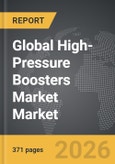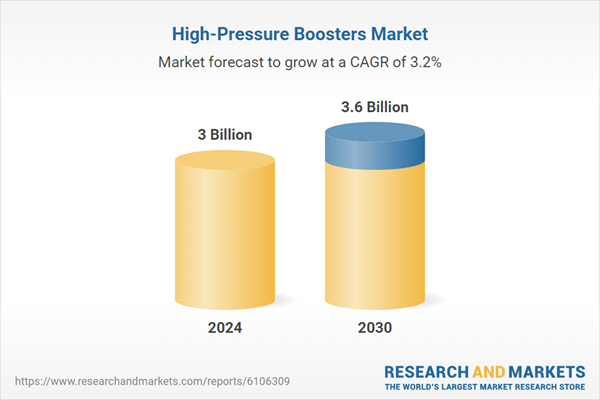Global High-Pressure Boosters Market - Key Trends & Drivers Summarized
Are High-Pressure Boosters Evolving into a Core Component of Critical Industrial Systems?
High-pressure boosters are rapidly becoming essential components in a wide range of industrial operations due to their ability to significantly amplify pressure levels for gases or fluids without compromising safety or efficiency. These devices are specially designed to optimize pressure delivery where conventional compressors or pumps may fall short, particularly in sectors that require high-intensity energy transfer such as aerospace, manufacturing, energy, and defense. High-pressure boosters are instrumental in applications such as pressure testing, hydraulic actuation, leak detection, and gas transfer, where consistent and high-output pressure is crucial for reliable performance. The growing need for process optimization, coupled with an emphasis on precision and operational safety, is prompting industries to integrate high-pressure booster systems into both mobile and fixed operations. They are also increasingly being used in medical, research, and environmental testing laboratories, where gas control and purity are critical. The evolution of booster technology, including air-driven and electrically powered systems, has made these units more compact, modular, and energy-efficient, allowing for greater integration in constrained environments. In high-stakes settings such as submarine operations, high-altitude aircraft, and emergency power units, the performance and reliability of pressure boosters can directly influence operational outcomes. As industries continue to evolve toward more demanding production and testing environments, high-pressure boosters are stepping in as a critical element of the equipment architecture, offering dependable pressure enhancement without the need for extensive overhauls or costly infrastructure upgrades.How Are Technological Advancements Shaping the Capabilities of High-Pressure Boosters?
Recent advancements in materials science, control systems, and mechanical design are significantly enhancing the performance and versatility of high-pressure boosters. New-generation boosters are being manufactured with corrosion-resistant alloys, precision-engineered seals, and thermally stable components that extend their operational life and reduce maintenance requirements. These improvements are especially important in high-pressure environments where durability and reliability are essential. Digital integration is also playing a pivotal role, with many boosters now equipped with smart sensors and programmable logic controllers that provide real-time feedback, monitor operating conditions, and ensure optimal performance through automated adjustments. Remote monitoring capabilities are allowing operators to track pressure output, temperature, and fluid behavior from centralized control systems, thus enhancing safety and efficiency in complex installations. Variable speed drives are being incorporated to fine-tune pressure delivery based on application-specific needs, reducing energy consumption and wear on components. Additionally, noise reduction technologies and vibration dampening materials are improving workplace comfort and compliance with occupational safety standards. Portable and modular booster units are gaining popularity in field-based industries like oil and gas exploration, where space, weight, and rapid deployment are critical. These units are designed to be easily transported and installed, expanding the operational flexibility of industries working in remote or challenging locations. Together, these technological innovations are not only improving the operational value of high-pressure boosters but also expanding their applicability to emerging industries such as hydrogen fueling infrastructure, carbon capture systems, and clean energy production.What Market Demands and Industrial Trends Are Shaping the Adoption of High-Pressure Boosters?
Industrial expansion, energy diversification, and stringent performance standards are significantly influencing the global demand for high-pressure boosters. As energy markets shift toward more diversified and sustainable sources, there is an increasing need for equipment that can handle high-pressure requirements in hydrogen processing, biofuel refining, and natural gas transportation. High-pressure boosters are becoming indispensable in these sectors for enabling compression, transfer, and storage of volatile or sensitive materials. The manufacturing sector, particularly in areas such as automotive, aerospace, and precision engineering, also depends heavily on boosters for conducting high-pressure testing and calibration processes. Additionally, the growing need for leak detection and system verification in high-risk installations is creating demand for booster systems that can simulate operating pressures safely and accurately. As industries face rising expectations for quality assurance and operational safety, high-pressure boosters offer a critical solution for verifying component integrity under realistic conditions. The medical and laboratory research fields are also contributing to market growth, as high-pressure boosters are used in gas chromatography, sterilization, and specialty gas handling. In construction and mining, booster systems are being deployed in pneumatic drilling and hydraulic fracturing operations, where consistent high pressure is required for efficient material removal or rock penetration. Furthermore, government regulations around pressure containment, emissions, and equipment certification are encouraging companies to upgrade their systems with more advanced and compliant booster units. These trends underscore the growing reliance on high-pressure boosters as a versatile, high-performance tool across multiple industries where precision and power are non-negotiable.What Core Drivers Are Propelling the Global High-Pressure Booster Market Forward?
The growth in the high-pressure boosters market is being fueled by several critical drivers linked to technological advancement, industry requirements, energy policy shifts, and infrastructure modernization. One of the primary growth enablers is the rising global demand for high-efficiency industrial systems capable of sustaining performance under extreme pressure conditions. As industries become more complex and globally integrated, the need for reliable pressure management systems has escalated, making high-pressure boosters a priority investment. Environmental and energy policies that promote the adoption of clean energy technologies are further supporting demand, particularly in hydrogen storage and fuel cell applications where precise gas compression is necessary. The widespread expansion of infrastructure projects in emerging markets is contributing to market momentum, as sectors like construction, transportation, and water management increasingly rely on booster systems for operations such as pipeline pressure maintenance and concrete pumping. Additionally, the transition toward Industry 4.0 is encouraging the use of intelligent booster systems with built-in diagnostics and energy optimization features, enhancing process automation and cost control. Innovations in manufacturing and design are reducing the footprint and operating costs of booster systems, making them more accessible to small and medium enterprises that previously relied on lower-capacity equipment. The post-pandemic resurgence of industrial activity and renewed emphasis on workplace safety and compliance are also prompting companies to modernize outdated systems with advanced booster technologies. These combined drivers are creating a robust foundation for continued growth in the high-pressure booster market, positioning it as a cornerstone in the future of efficient and safe industrial operations.Report Scope
The report analyzes the High-Pressure Boosters market, presented in terms of market value (US$). The analysis covers the key segments and geographic regions outlined below:- Segments: Booster Type (Air Booster Pumps, Gas Booster Pumps, Hydraulic Booster Pumps); Pressure Range (Below 500 Bar Pressure, 501-1000 Bar Pressure, Above 1000 Bar Pressure); End-Use (Oil & Gas End-Use, Manufacturing End-Use, Automotive & Aerospace End-Use, Construction & Mining End-Use, Other End-Uses).
- Geographic Regions/Countries: World; United States; Canada; Japan; China; Europe (France; Germany; Italy; United Kingdom; Spain; Russia; and Rest of Europe); Asia-Pacific (Australia; India; South Korea; and Rest of Asia-Pacific); Latin America (Argentina; Brazil; Mexico; and Rest of Latin America); Middle East (Iran; Israel; Saudi Arabia; United Arab Emirates; and Rest of Middle East); and Africa.
Key Insights:
- Market Growth: Understand the significant growth trajectory of the Air Booster Pumps segment, which is expected to reach US$2.2 Billion by 2030 with a CAGR of a 3.5%. The Gas Booster Pumps segment is also set to grow at 2.3% CAGR over the analysis period.
- Regional Analysis: Gain insights into the U.S. market, valued at $819.4 Million in 2024, and China, forecasted to grow at an impressive 6.1% CAGR to reach $719.6 Million by 2030. Discover growth trends in other key regions, including Japan, Canada, Germany, and the Asia-Pacific.
Why You Should Buy This Report:
- Detailed Market Analysis: Access a thorough analysis of the Global High-Pressure Boosters Market, covering all major geographic regions and market segments.
- Competitive Insights: Get an overview of the competitive landscape, including the market presence of major players across different geographies.
- Future Trends and Drivers: Understand the key trends and drivers shaping the future of the Global High-Pressure Boosters Market.
- Actionable Insights: Benefit from actionable insights that can help you identify new revenue opportunities and make strategic business decisions.
Key Questions Answered:
- How is the Global High-Pressure Boosters Market expected to evolve by 2030?
- What are the main drivers and restraints affecting the market?
- Which market segments will grow the most over the forecast period?
- How will market shares for different regions and segments change by 2030?
- Who are the leading players in the market, and what are their prospects?
Report Features:
- Comprehensive Market Data: Independent analysis of annual sales and market forecasts in US$ Million from 2024 to 2030.
- In-Depth Regional Analysis: Detailed insights into key markets, including the U.S., China, Japan, Canada, Europe, Asia-Pacific, Latin America, Middle East, and Africa.
- Company Profiles: Coverage of players such as Arc Vehicle Ltd., BMW Motorrad, Cake, Damon Motorcycles Inc., Ducati Motor Holding S.p.A. and more.
- Complimentary Updates: Receive free report updates for one year to keep you informed of the latest market developments.
Some of the 32 companies featured in this High-Pressure Boosters market report include:
- Aerzener Maschinenfabrik GmbH
- Alfred Kärcher SE & Co. KG
- Andritz AG
- Aqua-Tech Systems Inc.
- Atlas Copco AB
- Autoclave Engineers (Eriez)
- BAUER KOMPRESSOREN GmbH
- Butech Pressure Systems
- Cat Pumps
- CEJN AB
- CIRCOR International, Inc.
- Danfoss A/S
- Enerpac Tool Group
- Flowserve Corporation
- Gardner Denver (Ingersoll Rand)
- Grundfos Holding A/S
- Haskel International LLC
- HIP (High Pressure Equipment Company)
- Hydraulics International, Inc.
- KSB SE & Co. KGaA
- Maximator GmbH
- Parker Hannifin Corporation
- RESATO High Pressure Technology
- Sulzer Ltd.
- The Weir Group PLC
- Udor S.P.A.
- Vacuumschmelze GmbH & Co. KG
- Xylem Inc.
This edition integrates the latest global trade and economic shifts into comprehensive market analysis. Key updates include:
- Tariff and Trade Impact: Insights into global tariff negotiations across 180+ countries, with analysis of supply chain turbulence, sourcing disruptions, and geographic realignment. Special focus on 2025 as a pivotal year for trade tensions, including updated perspectives on the Trump-era tariffs.
- Adjusted Forecasts and Analytics: Revised global and regional market forecasts through 2030, incorporating tariff effects, economic uncertainty, and structural changes in globalization. Includes historical analysis from 2015 to 2023.
- Strategic Market Dynamics: Evaluation of revised market prospects, regional outlooks, and key economic indicators such as population and urbanization trends.
- Innovation & Technology Trends: Latest developments in product and process innovation, emerging technologies, and key industry drivers shaping the competitive landscape.
- Competitive Intelligence: Updated global market share estimates for 2025, competitive positioning of major players (Strong/Active/Niche/Trivial), and refined focus on leading global brands and core players.
- Expert Insight & Commentary: Strategic analysis from economists, trade experts, and domain specialists to contextualize market shifts and identify emerging opportunities.
Table of Contents
Companies Mentioned (Partial List)
A selection of companies mentioned in this report includes, but is not limited to:
- Aerzener Maschinenfabrik GmbH
- Alfred Kärcher SE & Co. KG
- Andritz AG
- Aqua-Tech Systems Inc.
- Atlas Copco AB
- Autoclave Engineers (Eriez)
- BAUER KOMPRESSOREN GmbH
- Butech Pressure Systems
- Cat Pumps
- CEJN AB
- CIRCOR International, Inc.
- Danfoss A/S
- Enerpac Tool Group
- Flowserve Corporation
- Gardner Denver (Ingersoll Rand)
- Grundfos Holding A/S
- Haskel International LLC
- HIP (High Pressure Equipment Company)
- Hydraulics International, Inc.
- KSB SE & Co. KGaA
- Maximator GmbH
- Parker Hannifin Corporation
- RESATO High Pressure Technology
- Sulzer Ltd.
- The Weir Group PLC
- Udor S.P.A.
- Vacuumschmelze GmbH & Co. KG
- Xylem Inc.
Table Information
| Report Attribute | Details |
|---|---|
| No. of Pages | 371 |
| Published | February 2026 |
| Forecast Period | 2024 - 2030 |
| Estimated Market Value ( USD | $ 3 Billion |
| Forecasted Market Value ( USD | $ 3.6 Billion |
| Compound Annual Growth Rate | 3.2% |
| Regions Covered | Global |









